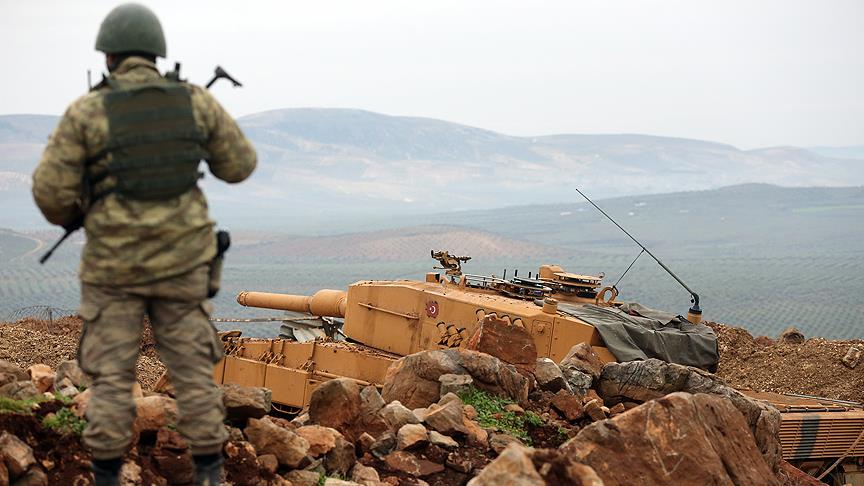
Afrin operation's effects on Turkish-US relations
Washington needs to understand the legitimate reasons why Turkey launched its anti-terrorism operation against the YPG in northern Syria
Share
Almost a week has passed since the Turkish Armed Forces (TSK) began Operation Olive Branch in Afrin. We have seen that over this week, the Turkish military has carried out effective attacks over both land and air and that it is rapidly advancing along with the Free Syrian Army (FSA).
Carried out as a result of Turkey's fight against the PKK terrorist organization, this operation began with the core purpose of ensuring Turkey's domestic security. Ankara prepared domestic public opinion before beginning the operation.
The public in Turkey has always supported the fight against the PKK. However, especially after the events that took place in the past few years, the PKK has become an organization that the public regards as one of the primary threats along with the Gülenist Terror Group (FETÖ), which was behind the July 15, 2016 coup attempt. The PKK embarked on a different strategy after 2015 and attempted to surpass only carrying out attacks in rural areas.
At this point, four important changes were seen. First, the PKK developed a new concept of urban warfare and began to carry out terrorist attacks in rural areas and cities, as well. Second, the PKK began carrying out attacks in the west of the country as well as the east. It carried out civilian massacres by using suicide bombers in metropolises like Istanbul, Ankara and İzmir. Third, the PKK declared itself to be the sole power in southeast Turkey that could establish public order and attempted to set up its own state formation. Fourth, the PKK attempted to incite Turkey's Kurds and create an environment ripe for civil war.
All of this was experienced between July 2015 and July 2016, and the public came to see the PKK as its nemesis. Thus, all operations against the PKK – especially after July 15 – have been greatly supported by the public whether inside Turkey or outside its borders.
Moreover, the public's regard for the PKK with such a sense of a threat was not something that either politicians or the bureaucracy could ignore.
Ankara also led a successful negotiation process with regional actors on the ground before the operation. Russia, with a strong presence in Afrin, saw how important this operation was for Turkey and acted on this certainty.
Alongside this, European countries also approached the operation without being swayed by the anti-Turkey discourse prevalent in Western media and took a more realist perspective.
Understanding how the U.S. is approaching the issue, however, is not as easy. The power fracture in U.S. domestic politics and general confusion has been reflected in the evaluations being made about Turkey's Afrin operation. On one hand, there were statements to the effect that the U.S. does not support any groups in Afrin and that the U.S. only supports the People's Protection Units (YPG) east of the Euphrates.
Later, an official announced that the U.S. would cease its support to the YPG east of the Euphrates if they left their positions to help the YPG in Afrin. The spokeswoman for the U.S. State Department blamed Russia and said that Russia was trying to interfere in the relations between the U.S. and Turkey.
Moreover, U.S. Central Command (CENTCOM) announced that it is against the operation through. On top of all that, U.S. President Donald Trump spoke with President Recep Tayyip Erdoğan on Wednesday. According to the White House statement, Trump spoke about lessening military activity, decreasing the speed of the operation, keeping Daesh as the focus and avoiding anything that would damage bilateral relations. Moreover, he emphasized partnership in order to ensure Turkey's legitimate security concerns. Another issue Trump brought up was the rising anti-American discourse from Turkish officials. I have been writing about this topic for nearly three years now in my column in Daily Sabah and the party most at fault for this is the U.S. and its own irresponsible policies.
Although in the statement the PKK is listed as a terrorist organization alongside Daesh, it is obvious that the U.S. is not happy at all with Ankara's use of hard power in Syria in order to begin another process of fighting, effectively against the PKK.
But fighting with the PKK is a life-or-death matter for Turkey and Ankara knows very well that the fight against the PKK goes through fighting the YPG in Syria.
This part is very clear. The PKK grew, taking advantage of the crisis in Syria with American support, and actually began to rule territories for the first time in its history. If the PKK continues its activities in Syria under the YPG, and the U.S. continues to arm and support it, that means the U.S. will lose Turkey.
And I think we have the right to ask which promises to Turkey has the U.S. actually kept concerning Syria?
[Daily Sabah, 26 January 2018]
Tags »
Related Articles






